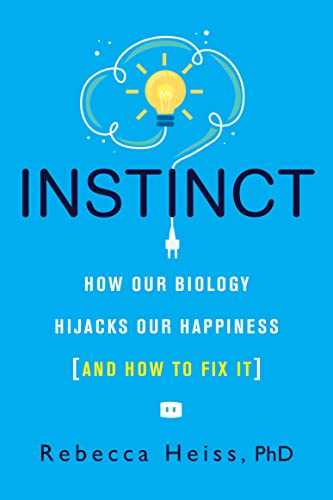I have a handful of books I wish everyone could read. Recently, I added another book to that list, Instinct: How Our Biology Hijacks Our Happiness [and How to Fix It] by Rebecca Heiss, PhD.
Long ago, I began to realize that human biological development has not kept pace with our social and technological developments. Our brains are hardwired to trigger behaviors that helped our species survive in the past, but can work against us these days. My short list of must-reads includes several books on this topic, such as Influence by Robert Cialdini and Predictably Irrational by Dan Ariely. They teach us how clever marketers—whether they market goods, services, beliefs or ideologies—can use our brain wiring to make their sales pitches virtually irresistible.
We rarely realized this is happening. It all flies below our conscious radar screens.
When Sometimes-Helpful Instincts Go Astray
Not all sub radar influences are imposed on us by marketers. Some come from our culture and surroundings. In Women Can Renew the World If… and So Can You, I write about how the language we use instills implicit bias against women in positions of status and visibility, thus robbing entire societies of women’s best potential contributions. In Instinct, Dr. Heiss explains how our high-tech lives keep us in an almost constant state of anxiety. She explains the biology behind this, the harm it does us, and how to fix it.
Chapter 1, “Survival,” deals with the fight, flight or freeze reaction to fear or anxiety. This was crucial to survival in the many millennia when humans routinely faced threats to their lives—tigers, hostile tribes, food shortages. Our bodies pump out lots of survival biochemicals that help us fight, fly or freeze. Such life-threatening situations did not last long back when that instinct evolved. If one survived the encounter with a member of a hostile tribe, brain and body chemistry returned to normal quickly. Our bodies are not designed to handle such floods of biochemicals over extended periods of time. When that happens, it takes a great toll on our physical and mental health and longevity.
I was especially concerned to learn that frequent presence of stress hormones can cause telomeres in our nervous systems to break down, leading to dementia and other conditions associated with aging.
We still need these biochemically driven instincts when faced with an imminent life or death situation, such as an armed robbery. But our modern lives keep them in overdrive too often. Heiss describes an all-too-familiar lifestyle in which technology that allows us to do things more quickly does not result in more leisure time. Rather, it results in pressure to do even more. Sometimes the pressure may come from a boss, sometimes it comes from oneself. Sadly, sometimes the anxiety in children comes from parents and teachers.
If we don’t answer every text message quickly enough, we feel anxious. Thus, we produce the same biochemicals as if we were being physically attacked. A delayed text is not life threatening. Life or death biochemistry is not what we need when we are trying to concentrate on a task. No wonder work suffers in terms of both quantity and quality.
Instinct suggests that we can counter this by doing something novel. If stuck in traffic, worried about getting to the next appointment, for example, try counting all the cars of a given color that you can see. Why not? If you’re stuck, counting cars won’t delay you any further, but it may reduce your anxiety.
How I Am Applying This
I’m pretty good about limiting text messages and how often I check my email. I take the time to prioritize how well I do a task, rather than how quickly I do it. Yet, I do feel a frequent undercurrent of anxiety and fear about things that, unlike a missed text, really are dangerous—things like politics, the war in Europe, climate change and more. But these things don’t bring a quick live-or-die result, like an encounter with a dangerous animal would. The Ukrainian war has gone on for months. I hope climate change can be reversed, but temperatures might not be back to safe levels in my lifetime.
I know that neither fighting, fleeing nor freezing is an effective response here. I know that I do a better job training people and writing my books and articles when I feel relaxed and upbeat. Yet, I sense that, even when long range dangers are not actually on my mind, they may be flying somewhere below my conscious radar screen.
When I’m doing something that doesn’t capture my full concentration, something like unloading the dishwasher, my mind tends to wander to things I fear. So I’ve decided to try Dr. Heiss’s suggestion of doing something novel during these trivial tasks. It’s proving rather fun.
One of the things I started is singing a silly song. A while ago I picked up a tray from which I had been eating, and on the way to the kitchen, I also picked up a long handled grabbing tool I keep handy to reach things on high shelves. I carried the tray in one hand and snapped the grabber open and shot like a talking mouth. It felt silly, which made me laugh at myself, which as someone said long ago, is the best medicine. I’ll be interested to see how I feel after a few weeks of this practice.
Try It Out
I invite you all to have a look at Instinct, try Dr. Heiss’s fixes, and let us know how they work out for you.

